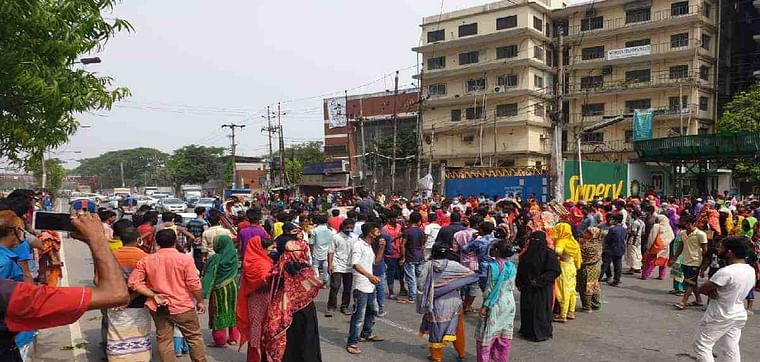
Half the month has passed amid the coronavirus outbreak, but till Thursday the workers of around 2000 factories in Savar, Ashulia, Gazipur, Narayanganj, Chattogram, Narsingdi, Mymensingh and Khulna have not been paid their wages. There are around 7,500 factories in these areas. These include factories for readymade garments, textiles, ceramics, footwear, jute and more.
According to the industrial police, there are 7,629 factories in these areas, of which 3,405 are readymade garment factories. However, the industrial police do not have data about the factories within Dhaka city.
State minister for labour Monnujan Sufian had issued a statement on Monday, saying that legal action would be taken against the factory owners who did not pay the workers’ wages by 16 April.
Superintendent of the industrial police headquarters Mohammad Amzad Hossain said that, 5,625 of the 7,629 factories had paid the workers’ wages. The workers of the remaining 2,036 factories hadn’t been paid till Thursday.
DIFE inspector general Shibnath Roy, on Thursday, was unavailable for comment as to whether legal action would actually be taken against the 2000 factories that had failed to pay the workers in the stipulated time.
RMG workers protest
The apex bodies readymade garment factory owners BGMEA and BKMEA had requested their member to pay the workers’ wages by 16 April. However, many of the factory owners failed to do so. As a result, workers of over 50 RMG (readymade garment) factories of Savar, Ashulia, Gazipur, Narayanganj, Chaottogram and Mymensingh staged demonstrations on Thursday, even blocking certain highways.
Bangladesh Ready Made Garments Manufacturers and Exporters Association (BGMEA) claims that of its 2,274 factories directly involved in export, 72 per cent, that is, 1,665, had paid the worker’s wages. That means, 87 per cent of the 2,472,000 workers, that is 2,159,000 workers received their wages, according to the claim.
The industrial police have said that workers of 12 factories in Savar and Ashulia had staged n demonstrations on Thursday, demanding their wages. Among these 12 factories were A One BD, Aline Apparel, Future Clothing, Adiar Apparels, Zed Apparels, Crytal Composite, Zed BD Apparel and Pentaford Apparels. And workers of 22 factories in Gazipur also staged protests. These factories included Mother Fashion, Shah Makdoom Garments, Prince Sweater, KG Garments, Elabert Fashion, Style Craft, Woolen Wear, Design Axis, Ayesha and Galia Fashion and Body Fashion.
Other factories in Narayanganj and Chittagong also staged demonstrations, according to the industrial police.
In this time of crisis, they [labour leaders] said, it was the responsibility of the government, the owners and the buyers to stand by these workers. They said that if the management was unable to pay, then the government would have to take responsibility. Also pressure must be put on the owners and buyers to form an emergency fund for the workers.
BGMEA president Rubana Huq said, “Among our member factories, 87 per cent have paid the workers’ wages. The factories which have not paid so far are mostly small and medium. We are working to provide assistance to the factories that are facing financial crises. The lockdown has also caused delay in wages.”
Meanwhile, Bangladesh Garment Workers Solidarity president Taslima Akhter, general secretary Julhas Nain Babu and organising secretary Aminul Islam issued a joint statement on Thursday, saying that the workers are panicking as they have not received their wages. In this time of crisis, they said, it was the responsibility of the government, the owners and the buyers to stand by these workers. They said that if the management was unable to pay, then the government would have to take responsibility. Also pressure must be put on the owners and buyers to form an emergency fund for the workers.
The Garment Workers Trade Union Centre staged a sit-in outside of the labour ministry office on Thursday morning, protesting against the non-payment of wages and lay-off announcements. General secretary of the organisation Jolly Talukdar said that over the past four weeks, at least 30,000 workers had been laid off. She said that the laid-off list was based on information given by the workers.









